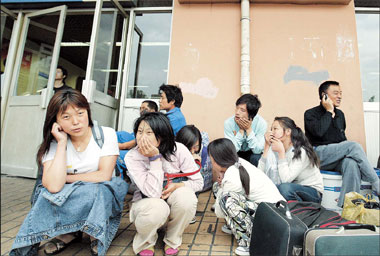The teeming Bazhangjing area of cramped narrow lanes and cheap markets in Hangzhou, capital city of Zhejiang Province, is a magnet for poor migrant workers, many of them young and vulnerable women who are exploited as ayis (domestic helpers) and cheap labor in many massage parlors and beauty salons.
The migrants' run-down hub is also the place to find unlicensed and unhygienic medical clinics, many for women - a clear sign of health needs but also a problem in themselves for city health authorities.
 |
|
Young migrant women wait for job opportunities outside a job agency. To help young, low-income migrant women in Hangzhou, a pilot education program has been launched to help them integrate with the larger society. [Shanghai Daily] |
"If you want to have a deep look at the living conditions and status of female migrants, Bazhangjing is the place," says Zhang Xiao, a 22-year-old hotel waitress who was just promoted to clerk.
"Life is rather hard for young migrant women, and many live four to five in a small cramped room of 15 square meters," says Zhang. Whatever their job, most earn less than 1,000 yuan (US$147) a month, she says.
Zhang is one of the first 50 women in a new pilot program to educate and help young, low-income migrant women in Hangzhou. The aim is to help them integrate with the larger society.
It offers education and vocational training and raises awareness of legal rights for migrants, especially rural women. It will also raise their awareness of HIV/AIDS and reproductive health issues. Community and recreational activities will help the women bond, give them more confidence and help them integrate.
The peer education project is co-sponsored by the Gongshu District Health Bureau, Tsinghua University and the United Nations Educational, Scientific and Cultural Organization (UNESCO). The aim is to eventually expand it to other big cities and help more young women migrants.
Hangzhou, like Shanghai, has become a huge melting pot for migrants pouring in from other provinces. The registered migrant population totals more than 2.9 million in Hangzhou, about a third of the entire city population, according to Hangzhou's Public Security Bureau.
Many migrants live in Bazhangjing area. It links the Daguan area in north, the Desheng District in south, busy Shaoxing Road in east and connects with the Grand Canal. The Shangtang Freeway passes overhead.
The education project running through 2012 involves 50 women - waitresses, hotel maids, cleaners, baby sitters and many others. It is hoped that each "graduate" will go out into the community, share her knowledge with other young women and encourage them to join the program.
A long-term interactive online platform will provide important information and encourage young women to share experiences.
"The program will provide free lessons to workers and help to improve their work skills, legal knowledge and health awareness," says Chen Weijian, director of the supervision division of the Hangzhou Public Health Bureau.
Zhang came to Hangzhou at the age of 19 and started as a dishwasher in a bistro in Bazhangjing. Then she was a hotel waitress, and she recently was promoted to hotel clerk, earning 1,500 yuan a month. She mostly copies documents and no longer needs to attend to fussy and demanding customers during late hours.
Zhang wants to settle in Hangzhou and says the easiest way is to marry a local man and get Hangzhou residential registration.
"Then I plan to open a small clothes shop and also sell my Hangzhou walnuts," she says. She hopes the education program will improve her prospects.
In addition to the many young women, there is smaller number of older women migrants, many of them married and in their 40s, who mostly do cleaning work. "Their children and husbands also live and work in Bazhangjing. They've got more pressure," Zhang says. In July researchers from Tsinghua University polled 105 female migrant workers aged from 15 to 29 years old in Bazhangjing. The findings: Average monthly income is 1,650 yuan, 63 want to gain or improve computer skills, 31 want to learn English, 32 want to work in hotel service and 21 want to learn hairstyling.
About 15 percent "don't know anything" about contraception, healthy child bearing and child rearing. Almost 70 percent say they "know a little bit" about reproductive health.
The program is one of four projects in China for young female migrants, funded by the UN-Spain Millennium Development Goals Achievement Fund.
Policy reform and new legislation ensuring migrants' rights have been introduced in China in recent years but progress is slow and uneven.
This program seeks to build a common strategy to address the needs of young disadvantaged women.
It will explore innovative solutions and good practices, and it aims to strengthen institutional capacities to be gender-sensitive and help women.
It will involve community centers, expanded learning opportunities and referral services.
A team of young migrants and UN experts will study the issues and women's needs and prepare training materials to be used throughout communities to help women migrants.
(Shanghai Daily September 16, 2009)